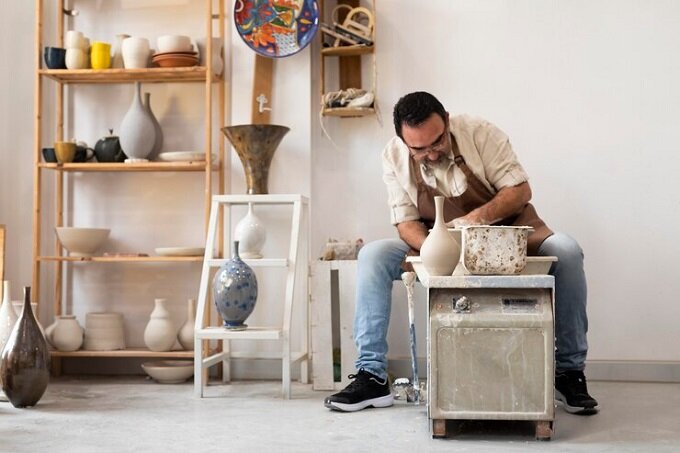Benefits of Choosing Local Artisans for Your Home Decor Needs

These days, it’s easy to get lost in a sea of mass-produced home decor, with the same styles and designs available everywhere you turn. But what if I told you there’s a whole world of unique, handmade alternatives out there, created by talented local artisans? In this article, we’ll explore the many benefits of choosing handmade home decor, from the personal touch and superior quality to the positive impact on our communities and the environment. So, get ready to fall in love with the handcrafted and discover why supporting local artisans is a choice that truly pays off.
Key Takeaways
- Handmade home decor offers consumers a unique, authentic, and personalized experience, unlike anything mass-produced.
- Supporting local artisans has a positive ripple effect on individuals, communities, and the environment.
- Handcrafted items showcase superior quality and craftsmanship, often using sustainable materials and production methods.
- Buying handmade preserves cultural heritage, supports small businesses, and creates a personal connection with the artisans themselves.
Uniqueness and Authenticity
When you choose a handmade product, you’re not just buying a mass-produced item that anyone can own. You’re investing in a one-of-a-kind piece that reflects the individual creativity and style of the artisan who created it. Handmade products are like fingerprints – no two are exactly alike. They bear the unique mark of their maker, making them truly special and giving your home a distinct character.
Imagine walking into a room and seeing a handmade textile hanging on the wall. The intricate designs and vibrant colors immediately catch your eye, and you know that this is no ordinary piece of art. You sense the time, effort, and love that went into its creation, and you feel a connection to the unknown artisan who poured their heart and soul into this work of art. That’s the power of handmade – it adds a layer of depth and meaning to your surroundings.
Superior Quality and Craftsmanship
Handmade products are often crafted with a level of attention to detail that is simply unmatched by mass-produced items. Skilled artisans take pride in their work, choosing high-quality materials and employing time-honored techniques to create durable and long-lasting products. They understand that their reputation is on the line with every piece they make, so they ensure that each item is carefully crafted and inspected before it leaves their workshop.
Artisans who produce handmade goods are masters of their craft, and it shows in the final product. For example, consider a handmade wooden chair. The artisan carefully selects the wood, ensuring it is of the finest quality, and then shapes and joins the pieces with precision and care. The result is a chair that is not only beautiful but also incredibly sturdy and comfortable – a true testament to the artisan’s skill and attention to detail.
Supporting Local Economies and Small Businesses
When you buy from local artisans, your money goes directly into supporting their livelihoods and the local economy. This has a positive ripple effect, as money spent locally is more likely to be recirculated within the community. It helps to support small businesses, create jobs, and keep traditional crafts alive.
Let’s say you purchase a handmade ceramic vase from a local artist. Not only are you getting a beautiful and unique piece for your home, but you’re also contributing to that artist’s ability to sustain their business and continue doing what they love. Additionally, your purchase may help them hire assistants or collaborate with other local businesses, further strengthening the local economy and community.
Sustainability and Environmental Responsibility
Many local artisans are committed to using sustainable materials and production methods, minimizing their impact on the environment. They source locally, use recycled or upcycled materials, and employ traditional techniques that have a lower carbon footprint. By buying from these artisans, you’re supporting environmentally friendly practices and reducing your own carbon footprint.
For instance, consider a local artisan who creates handmade soap using natural, organic ingredients and essential oils. They package their soaps in recyclable paper instead of plastic, and they may even offer a refill option to reduce waste. By choosing their product over a mass-produced alternative, you’re not only treating your skin to a natural, luxurious experience but also making a more sustainable choice that benefits the planet.
Preserving Cultural Heritage and Traditions
Local artisans often draw on traditional techniques and cultural influences in their work, helping to preserve and pass down these cultural traditions. Their creations may feature intricate designs or techniques that have been passed down through generations, ensuring that these skills and cultural heritage are not lost.
Take, for example, a local artisan who creates handmade rugs. Their designs may incorporate traditional motifs and patterns that hold cultural significance, and they might use natural dyes and weaving techniques that have been used for centuries. By purchasing one of their rugs, you’re not only adding a beautiful and functional piece to your home but also supporting the preservation of cultural heritage and indigenous communities.
Personal Connections and Emotional Resonance
One of the most special aspects of buying handmade is the opportunity to connect with the artisans behind the products and learn about their inspirations and stories. This personal connection creates an emotional resonance and adds value to the product that is often lacking in mass-produced items.
When you purchase a handmade piece of jewelry, for instance, you might have the chance to meet the maker and hear about their creative process, the sources of their materials, and the story behind their unique designs. This connection makes the piece even more meaningful and can foster a sense of appreciation for the maker’s craft and the hard work that goes into creating each item.
Challenges and Considerations for the Handmade Industry
Of course, it’s important to acknowledge that the handmade industry does face certain challenges. Artisans and small businesses often compete with mass-produced items that may be cheaper and more readily available. Scaling production while maintaining quality can also be difficult, and marketing and selling their products effectively is a constant hurdle.
However, many artisans and small businesses are rising to these challenges. They’re embracing innovative marketing strategies, including online sales and social media, to reach a wider audience. They’re collaborating with other local businesses and artisans to pool resources and knowledge. And they’re educating consumers about the benefits of handmade, helping them to understand the value and impact of their purchasing decisions.
Conclusion
Choosing handmade home decor offers countless benefits, from supporting local economies and small businesses to preserving cultural heritage and reducing our environmental impact. But perhaps the most important benefit is the personal connection and sense of community it fosters. When we buy from local artisans, we’re not just buying a product – we’re investing in people, traditions, and sustainability.
So, the next time you’re looking to decorate your home, consider seeking out local artisans and handmade goods. By supporting them, you’re not only adding unique and high-quality pieces to your space but also making a positive impact on individuals, communities, and the environment. Remember, every handmade product has a story behind it, and by choosing handmade, you become a part of that story.




